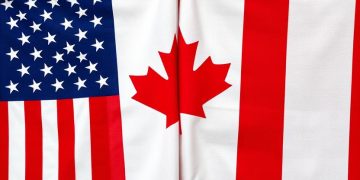Canadian Prime Minister Mark Carney confirmed that former U.S. President Donald Trump raised the idea of Canada becoming the United States’ “51st state” during a phone call in late March.
Speaking at a campaign press conference on Thursday, Carney stated that Trump had made similar comments previously and repeated them during their 28 March conversation. “The president brings this up all the time. He brought it up yesterday. He brought it up before,” Carney said. When asked for clarification, he added, “He has these things in his mind. This is not news.”
The phone call took place during the opening week of Canada’s election season. Carney emphasized that Canada would not entertain such a proposal. “As I’ve said to anyone who’s raised this issue in private or in public, including the president, it will never happen,” he said.
President Trump, speaking to the BBC on Wednesday, confirmed that he had spoken with Carney “several times” and described the conversations as “very good.” He also stated that he did not intend to interfere in Canada’s election.
Despite Trump’s comments about maintaining neutrality, his administration’s trade policies have become a central issue in the Canadian election campaign. Trump’s re-election brought continued discussions about Canada’s trade relationship with the United States, including the imposition of new tariffs.
Since taking office for a second term, Trump has repeatedly referred to Canada as a potential “51st state” and previously referred to former Canadian Prime Minister Justin Trudeau as a “governor,” the title used for leaders of U.S. states.
These remarks, alongside the ongoing U.S.-Canada trade tensions, have contributed to heightened political sensitivity. Trump’s administration imposed a 25% tariff on Canadian-made automobiles in March, in addition to previous tariffs on Canadian steel, aluminum, and other products. Goods covered by the United States-Mexico-Canada Agreement (USMCA) were exempted from some of these measures.
In response, Conservative Party leader Pierre Poilievre publicly condemned the new tariffs, calling them “unjustified and unprovoked.”
During a recent French-language debate, leaders of Canada’s four major federal parties were questioned on their strategies for managing relations with the U.S. and addressing trade challenges.
Polling data indicates that the Liberal Party holds a slight lead over the Conservative Party as of late April, according to CBC News. Early voter turnout has been high, with over seven million Canadians casting ballots ahead of election day.
Canada’s federal election is scheduled for Monday.
Find the latest updates in supply chain logistics news at The Supply Chain Report. Visit ADAMftd.com for free international trade tools.
#CanadaUSRelations #PrimeMinisterStatement #TrumpRemarks #51stState #DiplomaticRelations #InternationalPolitics #USCanadaTies















